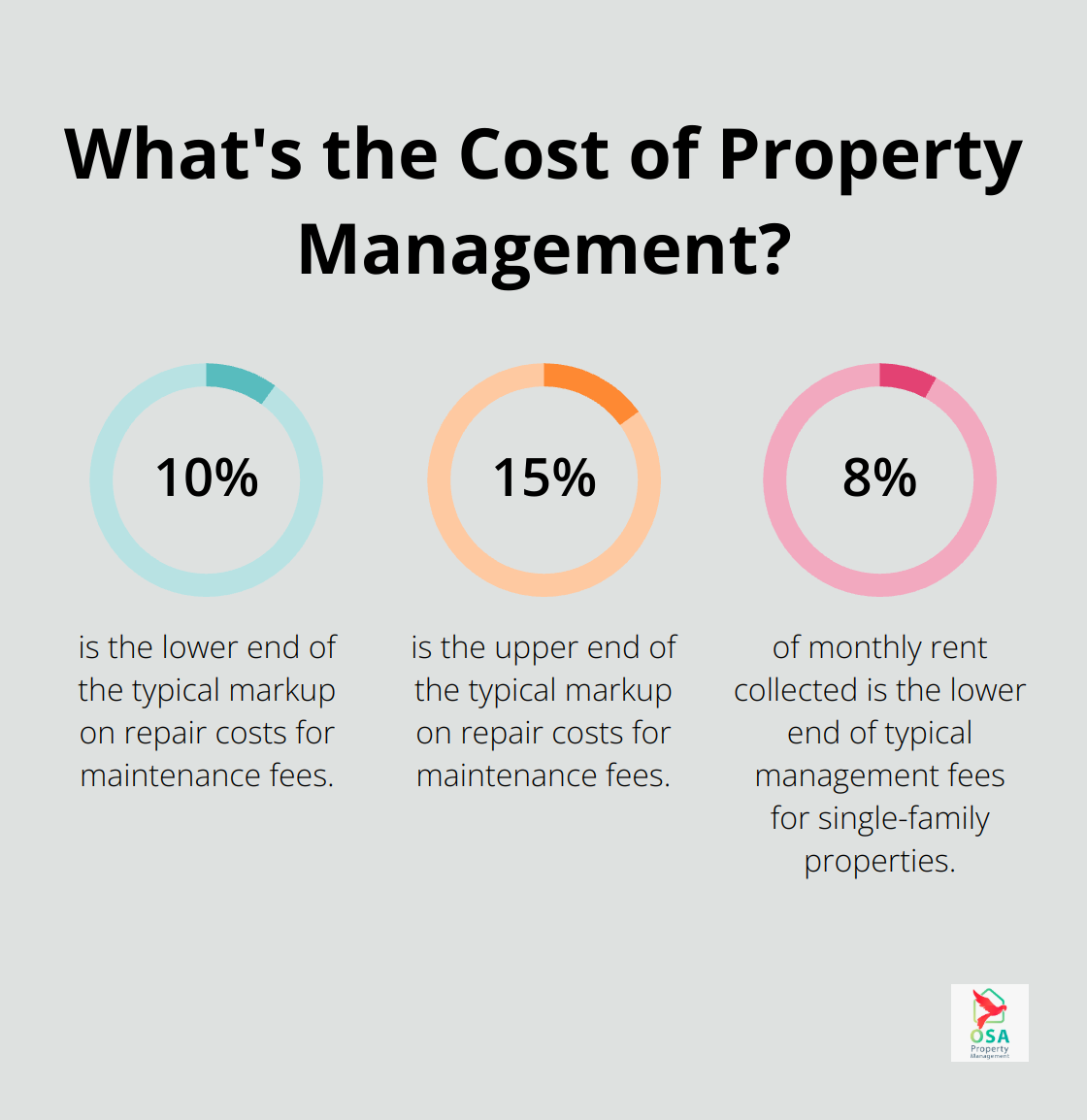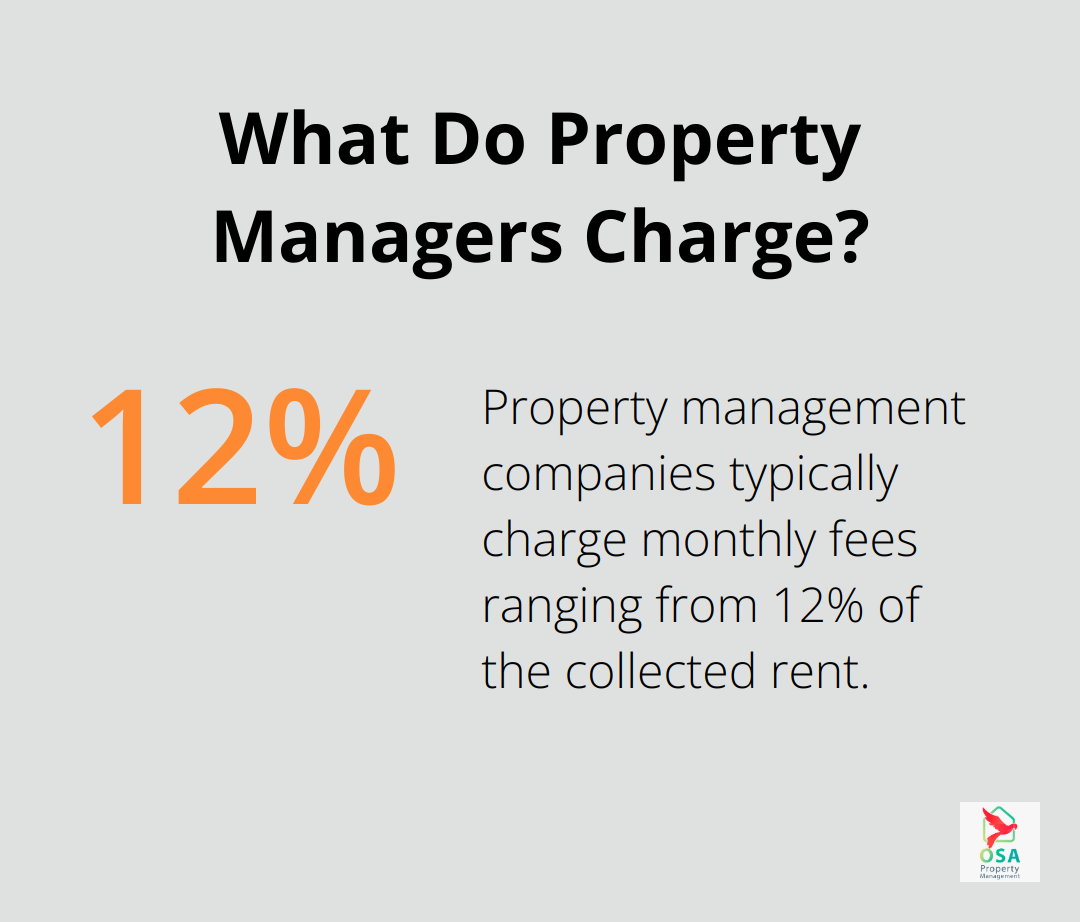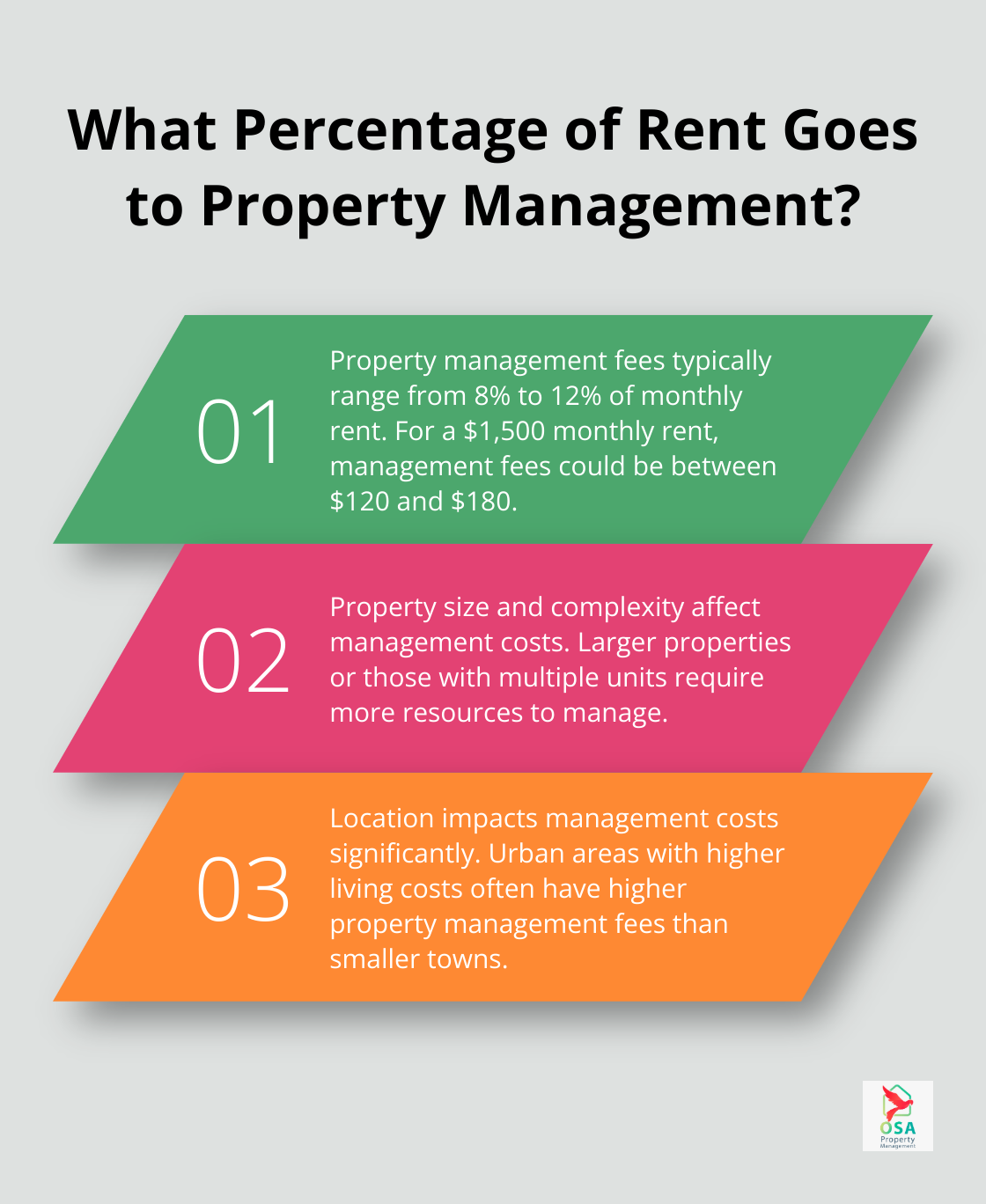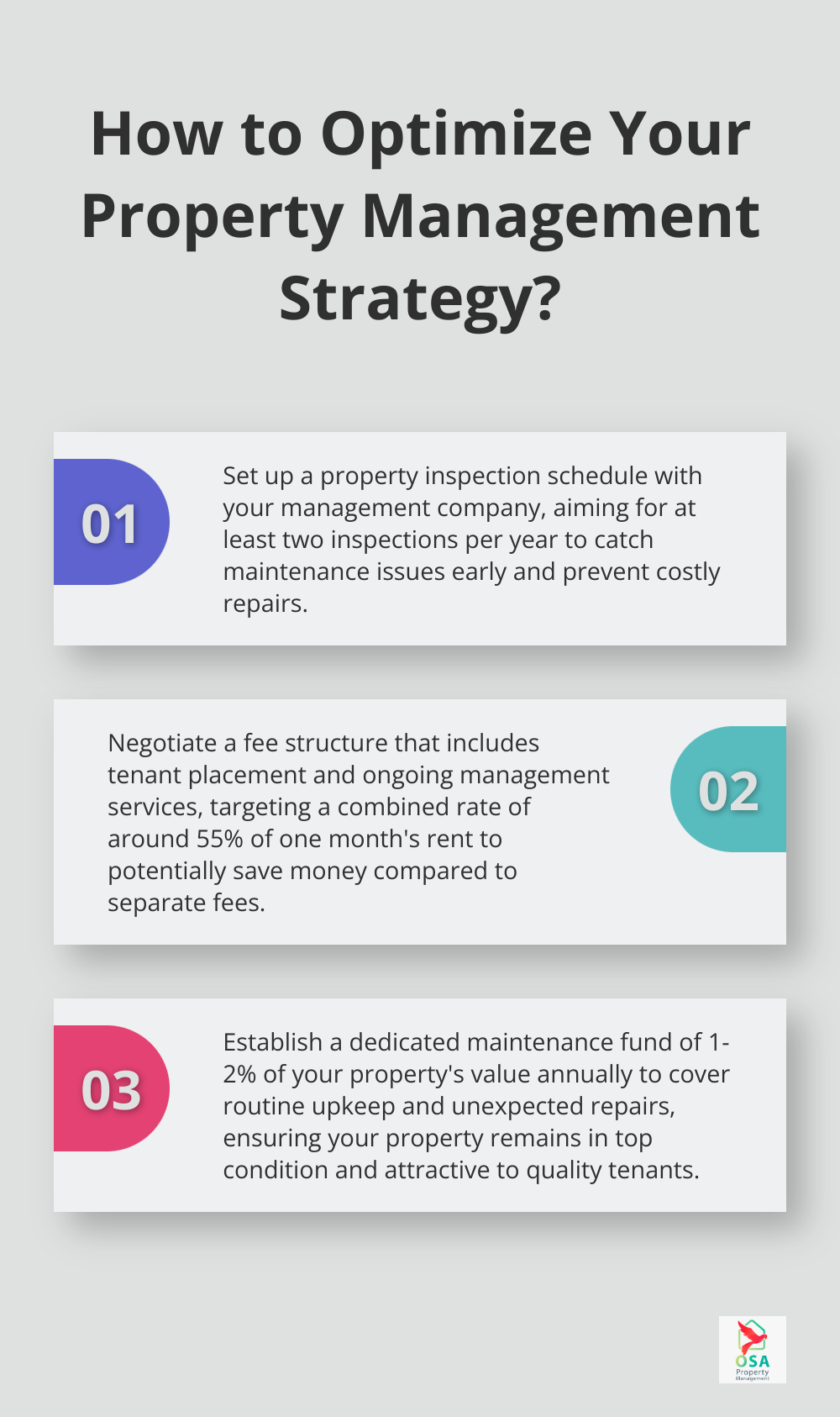At Osa Property Management, we often field questions about property management costs. Understanding how much rental property management companies charge is crucial for property owners looking to maximize their investments.
This comprehensive guide breaks down the various fees associated with property management services, helping you make informed decisions about your real estate portfolio.
What Do Property Management Fees Cover?
Management Fees: The Core of Property Management
Management fees form the backbone of property management services. These typically range from 8% to 12% of the monthly rent collected for single-family properties. This fee covers day-to-day operations, including rent collection, tenant communication, and coordination of routine maintenance.
Leasing Fees: Finding Quality Tenants
Leasing fees apply when a property management company finds and places a new tenant. While this might appear steep, consider the value of having a reliable tenant who pays rent on time and takes care of your property. Good tenant placement can save you thousands in potential damages and lost rent over time.
Maintenance Fees: Keeping Your Property in Top Shape
Maintenance fees vary widely depending on the property’s needs. Some companies charge a markup of 10% to 15% on repair costs. Others might have a flat fee structure for routine maintenance. Regular maintenance prevents costly repairs down the line. For example, a $200 annual HVAC check-up could save you from a $5,000 system replacement.
Additional Services: Customizing Your Management Package
Many property management companies offer additional services (such as property inspections, financial reporting, or eviction handling) that may incur extra fees. These services allow property owners to customize their management package to fit their specific needs and budget.
The Value Proposition of Property Management
Property management fees can significantly impact your rental income, but they also provide value through professional services and peace of mind. When choosing a property management company, look beyond the fee structure to the quality of services offered. A company that charges slightly more but has a track record of lower vacancy rates and higher-quality tenants might prove more cost-effective in the long run.

As we move forward, it’s important to understand how various factors can affect these property management costs. Let’s explore the elements that influence fee structures and overall expenses in the next section.
Typical Property Management Charges
Monthly Management Fees
Property management companies typically charge monthly fees ranging from 8% to 12% of the collected rent. For a property renting at $1,500 per month, this translates to $120 to $180 in management fees. Some companies offer flat rates instead of percentages, which can benefit high-value properties. (A $300 flat fee might prove more cost-effective than a 10% fee on a $4,000 monthly rent.)
Tenant Placement Fees
Finding quality tenants is essential for long-term property success. Tenant placement fees average 69.6% for tenant placement only, while combined tenant placement and management services average 54.5%. This fee covers property marketing, tenant screening, and lease signing processes. While this fee may seem high, it pales in comparison to the potential costs of a bad tenant, which can include thousands in eviction expenses and months of lost rent.
Maintenance and Repair Costs
Maintenance fees vary widely based on property needs. Some management companies add a 10% to 15% markup on repair costs, while others use a flat fee structure for routine maintenance. It’s important to discuss the maintenance process with your property manager, including their contractor network and emergency repair procedures. (Companies with established relationships with local contractors often secure more competitive pricing and faster service.)
Additional Services
Many property management companies offer extra services that may incur additional fees:
- Property inspections: Often priced at $50-$100 per inspection
- Eviction handling: Can cost $200 to $500, plus legal fees
- Financial reporting: Some companies charge extra for detailed financial reports
Choosing the Right Property Management Company
When selecting a property management company, consider which additional services you might need. A company offering comprehensive services might save you money in the long run, even if their base fees are slightly higher. The quality of service, local market knowledge, and track record of success should weigh heavily in your decision.

As you evaluate different property management companies and their fee structures, it’s important to understand how various factors can influence these costs. Let’s explore the elements that affect property management expenses in the next section.
What Drives Property Management Costs?
Property Complexity and Size
The complexity and size of your property significantly impact management costs. Larger properties or those with multiple units require more time and resources to manage, often resulting in higher fees. Property management fees typically range from 8% to 12% of the monthly rent. For example, if your property rents for $1,500 per month, you might pay between $120 and $180 in monthly management fees.
Location Impact
Your property’s location strongly influences management costs. Urban areas with higher living costs and more competitive markets often see higher property management fees. Managing a property in San José, Costa Rica, might cost more than managing a similar property in a smaller town like Uvita. This difference stems from variations in local market conditions, labor costs, and the level of competition among property management companies.
Service Level Requirements
The extent of services you require from your property management company directly affects your costs. Basic services like rent collection and maintenance coordination form the core of most management packages. However, additional services such as extensive marketing campaigns, regular property inspections, or handling complex legal issues can increase your overall expenses. It’s important to assess which services are essential for your property and which ones you might handle yourself or forego to keep costs in check.
Quality vs. Cost Considerations
While it might seem appealing to choose the lowest-cost provider, the cheapest option isn’t always the most cost-effective in the long run. Quality management can lead to better tenant retention, fewer vacancies, and well-maintained properties (potentially offsetting higher upfront costs). Professional property maintenance can be a cost-effective solution for all your property needs. When selecting a property management company, consider the value they provide rather than focusing solely on the price tag.
Market Conditions and Competition
The local real estate market and level of competition among property management companies can affect pricing. In areas with high demand for rental properties and limited management options, fees may be higher. Conversely, in markets with many property management companies, competition might drive prices down (or lead to more comprehensive service offerings at competitive rates).

Final Thoughts
Property owners must understand how much rental property management companies charge to maximize their investments. Typical fee structures include monthly management fees of 8% to 12% of collected rent, tenant placement fees of 50% to 100% of the first month’s rent, and additional charges for services like maintenance and inspections. When selecting a property management company, owners should look beyond price and consider factors such as track record, client testimonials, and local market knowledge.
Osa Property Management offers customized service packages tailored to the unique challenges of managing properties in Costa Rica. With over 19 years of experience in areas like Tarcoles, Jaco, Dominical, Manuel Antonio, Ojochal, and Uvita, we provide comprehensive property management solutions. Our services cover marketing, tenant relations, bill payment, and tax compliance, ensuring peace of mind for homeowners.

The decision to hire a property management company should result from a careful cost-benefit analysis. While fees are important, the value provided through professional management, time savings, and potentially increased rental income often outweighs the costs (especially in complex markets like Costa Rica). Partnering with the right property management company can transform a real estate investment from a time-consuming responsibility into a streamlined, profitable venture.

